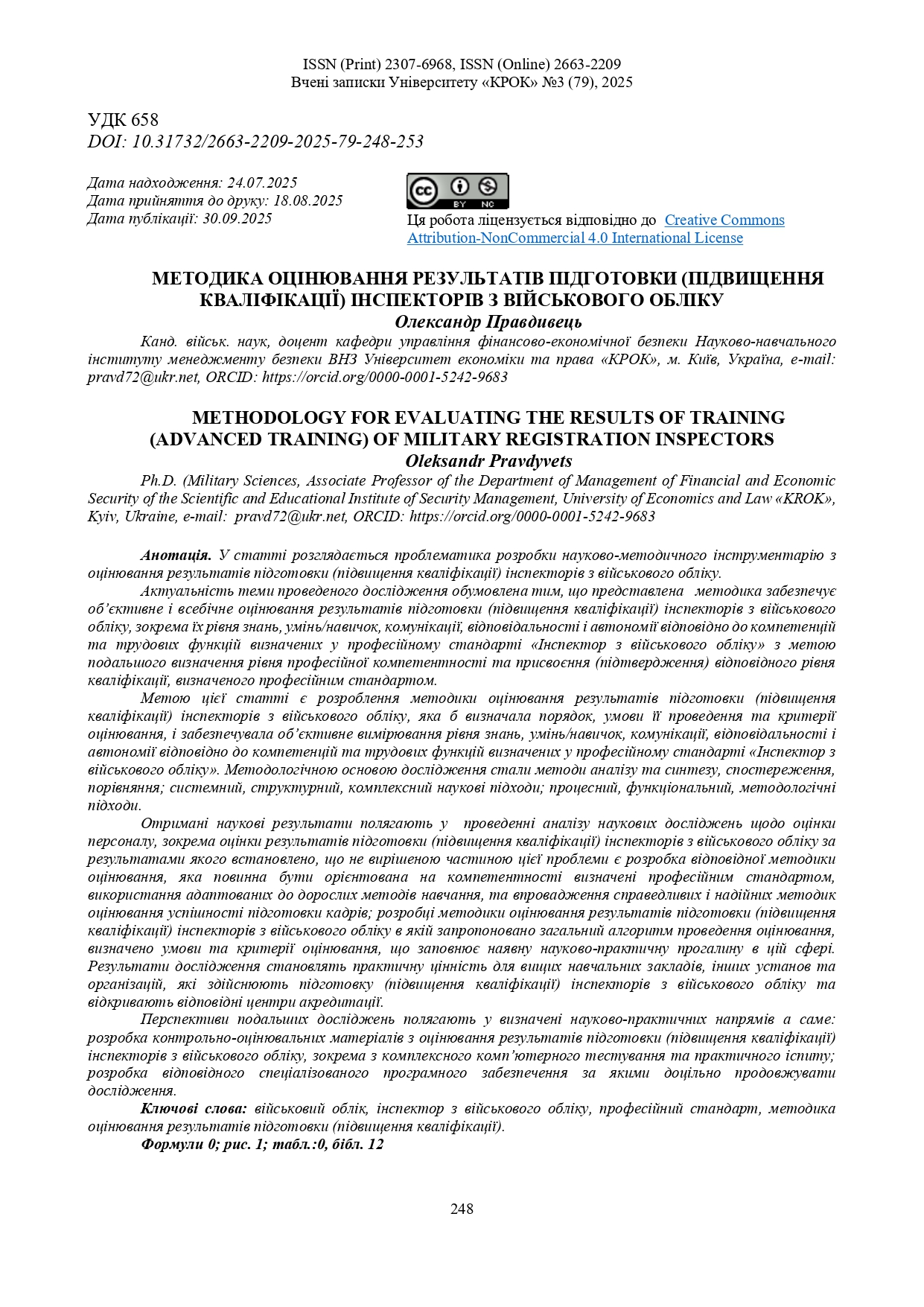METHODOLOGY FOR EVALUATING THE RESULTS OF TRAINING (ADVANCED TRAINING) OF MILITARY REGISTRATION INSPECTORS
DOI:
https://doi.org/10.31732/2663-2209-2025-79-248-253Keywords:
military accounting, military accounting inspector, professional standard, methodology for evaluating the results of training (advanced training)Abstract
The article discusses the problems of developing scientific and methodological tools for evaluating the results of training (advanced training) of military accounting inspectors.
The relevance of the topic of the study is due to the fact that the presented methodology provides an objective and comprehensive assessment of the results of training (advanced training) of military accounting inspectors, in particular their level of knowledge, skills/abilities, communication, responsibility and autonomy in accordance with the competencies and labor functions defined in the professional standard "Military Accounting Inspector" in order to further determine the level of professional competence and assign (confirm) the appropriate level of qualification determined by the professional standard.
The purpose of this article is to develop a methodology for evaluating the results of training (advanced training) of military accounting inspectors, which would determine the procedure, conditions for its conduct and evaluation criteria, and provide an objective measurement of the level of knowledge, skills/abilities, communication, responsibility and autonomy in accordance with the competencies and labor functions defined in the professional standard "Military Accounting Inspector". The methodological basis of the study was the methods of analysis and synthesis, observation, comparison; systemic, structural, integrated scientific approaches; process, functional, methodological approaches.
The scientific results obtained consist in the analysis of scientific research on personnel assessment, in particular the assessment of the results of training (advanced training) of military accounting inspectors, according to the results of which it was established that the unsolved part of this problem is the development of an appropriate assessment methodology, which should be focused on competencies defined by professional standards, the use of adult-adapted teaching methods, and the introduction of fair and reliable methods for assessing the success of training; development of a methodology for evaluating the results of training (advanced training) of military accounting inspectors, which proposes a general algorithm for conducting assessment, determines the conditions and criteria for evaluation, which fills the existing scientific and practical gap in this area. The results of the study are of practical value for higher educational institutions, other institutions and organizations that train (advanced training) of military accounting inspectors and open appropriate accreditation centers.
Prospects for further research consist in the identification of scientific and practical areas, namely: development of control and evaluation materials for assessing the results of training (advanced training) of inspectors in military accounting, in particular in complex computer testing and practical examination; development of appropriate specialized software for which it is advisable to continue research.
Downloads
References
Реєстр професійних стандартів – професійний стандарт “Інспектор з військового обліку” (ID: 693-692) : Національне агентство кваліфікацій. https://register.nqa.gov.ua/uploads/0/69392_proekt_ps_inspektor_z_vo_ostanna_versia.pdf
Деякі питання акредитації кваліфікаційних центрів : постанова Кабінету Міністрів України від 22.09.2021 № 986. https://zakon.rada.gov.ua/laws/show/986-2021-%D0%BF#Text.
Добрянська, Н. (2025). Правове регулювання оцінювання результатів службової діяльності державних службовців в Україні: проблеми та перспективи розвитку. Вчені записки ТНУ ім. В. І. Вернадського. Т. 36 (75). № 1. С. 61-65.
Косевцов, В. (2021). Оцінювання персоналу військової організаційної структури під час виконання ним завдань за призначенням. Social Development and Security. № 4. С. 18-26.
Тарасюк, Ю. (2022). Компетентнісний підхід в освітньому процесі військових закладів вищої освіти. Актуальні питання гуманітарних наук. № 2(53). С. 311–315.
Винокуров, Д. (2022). Методичний підхід щодо оцінювання рівня компетентностей змінного складу навчального центру. Сучасні інформаційні технології у сфері безпеки та оборони. № 2(44). С. 69-73.
Салаш, О., Георгадзе, О. (2022). Часткова методика оцінювання стану індивідуальної підготовки військовослужбовців в органах військового управління. Social Development and Security. Т. 12. № 5. С. 10-20.
Тадеєв, П., Тадеєва, М. (2004). Форми і методи оцінювання результатів сформованості операційних та практичних умінь учнів наукових ліцеїв (вітчизняний та зарубіжний формат). Духовність особистості: методологія, теорія і практика. № 1(108). С. 215-230.
Kirkpatrick, D.(1994). Evaluating Training Programs: The Four Levels. –San Francisco, CA: Berret-Koehler Publishers, Inc. 340 р.
Марчук, А. (2020). Андрагогіка: навчальний посібник. Львів: ДУВС. 300 с.
Ковтунець, В., Лилик, І. (2021). Посібник для оцінювачів результатів навчання для присвоєння професійних кваліфікацій. Київ: ВІСТКА. 156 с.
Про затвердження Національної рамки кваліфікацій : Постанова Кабінету Міністрів України від 23 листопада 2011 р. № 1341. https://zakon.rada.gov.ua/laws/show/1341-2011-%D0%BF#Text.

Downloads
Published
How to Cite
Issue
Section
License

This work is licensed under a Creative Commons Attribution-NonCommercial 4.0 International License.

